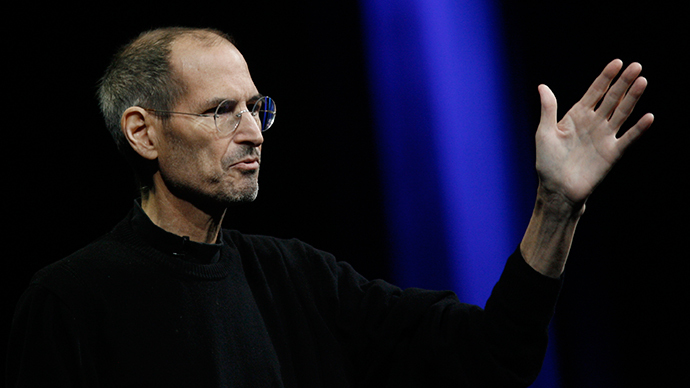Voice from beyond: Steve Jobs testifies in court 3 years after death

The legendary Apple CEO has become a star witness in a US antitrust trial, having come before the courtroom in a video played by the company’s attorneys.
The courtroom was “transfixed” by Steve Jobs’ posthumous testimony on Friday, according to AP correspondent Brandon Bailey.
In the video, which was recorded six months before Jobs’ death, he defended Apple’s policy of making iPods in between 2006 and 2009 accept only music from iTunes store, while blocking content from competing services.
READ MORE: Apple reveals new operating system it claims is police-proof
The plaintiffs in the case now being heard in an Oakland court
believe Apple intentionally would not allow other music stores to
adapt their systems to iPod in order to become a monopolist in
the market.
Videotaped Jobs claims the system was rigorously kept closed for
security reasons – to save it from hackers and thus to save the
company from having to sort things out with music labels.
"We went to great pains to make sure that people couldn't
hack into our digital rights management system because if they
could, we would get nasty emails from the labels threatening us
that they were going to yank the license," Jobs said,
according to a transcript published by The Verge. The video has
not so far been made public.

Earlier the plaintiffs, though, showed an email from Eddy Cue,
who runs Internet software and services for Apple, saying music
labels actually wanted iPods to be able to play music from other
services.
Apple executives insist the labels were pressing the company even
harder with demands of protecting the content from unauthorized
copying.
READ MORE: Steve Jobs, Google CEO plotted ‘gentlemen’s agreement’ to keep wages down – report
The message about making devices more compatible "was in
conflict with what they were telling me to do" about
security, said Jeff Robbin, who oversaw iTunes engineering and
helped create the iTunes software, AP reports.
"The plaintiffs in this case are making one of the most
aggressive arguments that is available in antitrust law -- that a
company can actually have a duty to allow rivals to use that
company's property," David Olson, an assistant professor at
Boston College Law School and an antitrust expert, told CNET.
"Obviously the court cannot change the past, but if it finds
that Apple did have a duty to deal with rivals and violated it by
locking them out, then plaintiffs can be awarded damages up to
three times the amount of the injury."
The plaintiffs are claiming $350 million in damages, but if the
jury finds Apple guilty of violating antitrust laws the company
could have to pay more than $1 billion.
The trial will continue next week.












